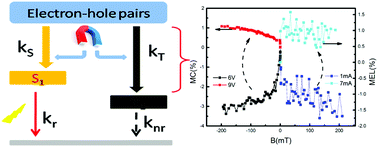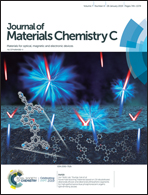An inversion of magnetic field effects in electromer-based organic light-emitting diodes†
Abstract
We investigate the magneto-conductance and magneto-electroluminescence effects in 4,4′-(cyclohexane-1,1-diyl)bis(N,N-di-p-tolylaniline) (TAPC)-based OLEDs. A novel property of negative magneto-conductance and magneto-electroluminescence effects is observed, and their sign changes with the applied voltage or current. It has been demonstrated that magneto-conductance is mainly caused by the magnetic field-induced electron–hole recombination process, which is dependent on the different applied voltages, leading to the inversion of magneto-conductance. The negative magneto-electroluminescence located at 580 nm (electromer) is related to the larger ratio of the singlet exciton formation rate kS to the triplet exciton formation rate kT. In particular, this ratio varies with the injected current, which leads to an inversion of magneto-electroluminescence. Our results indicate that the value of the kS/kT ratio in OLEDs can be varied by the applied voltages or injected currents, finally affecting the electroluminescence performance of OLEDs.



 Please wait while we load your content...
Please wait while we load your content...